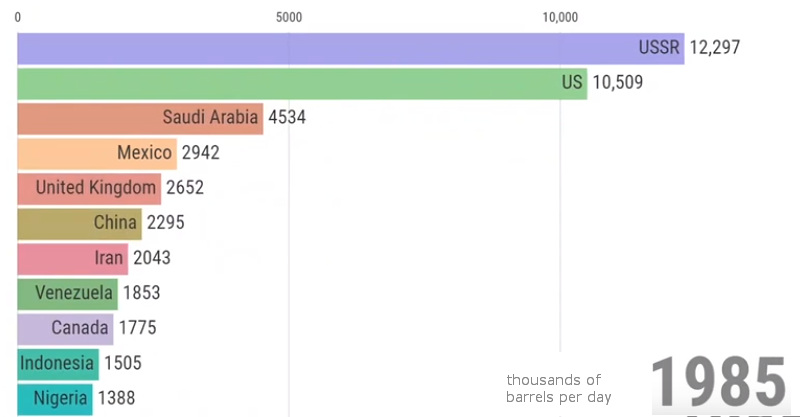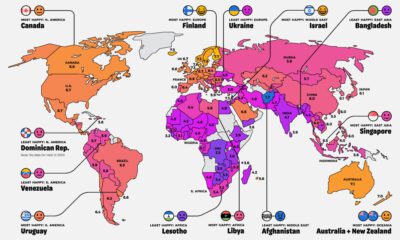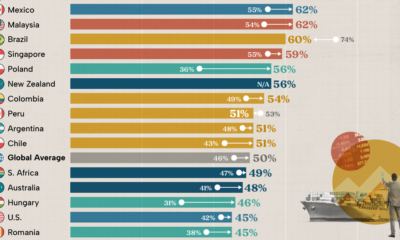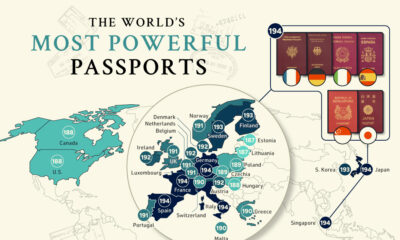Energy
The Largest Producers of Crude Oil (1965-2017)
The global production of oil is driven by a host of complex factors, ranging from resource scarcity to a country’s access to the latest technological breakthroughs.
As these factors play out, the oil production landscape can dramatically change.
Countries can secure energy independence and global influence by rising up the rankings – or they can fall off the map completely, becoming a footnote on the global stage.
Animation: The Changing Oil Landscape
Today’s animation shows you how the oil landscape has changed, in terms of production by country, in less than a minute of time.
Data here comes from the BP Statistical Review of World Energy, 2018, which chronicles oil production by country all the way from 1965-2017.
The animation starts in 1965 during the height of the Cold War – a time when it was becoming incredibly evident that the ability to produce oil self-sufficiently would be a crucial advantage for any type of global superpower.
| Rank | Country | Oil production (bpd) in 1965 |
|---|---|---|
| #1 | 🇺🇸 United States | 9.0 million |
| #2 | ☭ USSR | 4.9 million |
| #3 | 🇻🇪 Venezuela | 3.5 million |
| #4 | 🇰🇼 Kuwait | 2.4 million |
| #5 | 🇸🇦 Saudi Arabia | 2.2 million |
| #6 | 🇮🇷 Iran | 1.9 million |
| #7 | 🇮🇶 Iraq | 1.3 million |
| #8 | 🇱🇾 Libya | 1.2 million |
| #9 | 🇨🇦 Canada | 0.9 million |
| #10 | 🇩🇿 Algeria | 0.6 million |
During this stretch of time, the United States was the undeniable leader in oil production, producing an average of 9.0 million barrels per day.
Put another way, U.S. oil production nearly double that of the entire USSR, or four times as much as the largest Arab producer (Kuwait), making this period a heyday of U.S. energy dominance.
Modern Production Figures
According to the BP Statistical Review of World Energy 2018, here is how oil production has shaped up based on more recent data.
| Rank | Country | Oil production (bpd) in 2017 |
|---|---|---|
| #1 | 🇺🇸 United States | 13.1 million |
| #2 | 🇸🇦 Saudi Arabia | 12.0 million |
| #3 | 🇷🇺 Russian Federation | 11.3 million |
| #4 | 🇮🇷 Iran | 5.0 million |
| #5 | 🇨🇦 Canada | 4.8 million |
| #6 | 🇮🇶 Iraq | 4.5 million |
| #7 | 🇦🇪 United Arab Emirates | 3.9 million |
| #8 | 🇨🇳 China | 3.8 million |
| #9 | 🇰🇼 Kuwait | 3.0 million |
| #10 | 🇧🇷 Brazil | 2.7 million |
As you can see, there are essentially three superpowers that produce over 10 million barrels of oil per day: United States (13.1 million), Saudi Arabia (12.0 million), and Russia (11.3 million).
Together, these three countries combine for 39.1% of global oil production, and about 24.9% of the world’s proven oil reserves.
After this group, there is a significant dropoff: Iran (5.0 million bpd), Canada (4.8 million bpd) and Iraq (4.5 million bpd) each have a 5% share of global production, while the U.A.E. and China are next on the list.
In total, the top 10 producers of crude oil combine for roughly 70% of the global total – meaning the world’s other 183 countries added together produce just 30% of the world’s total crude.
Energy
Charted: 4 Reasons Why Lithium Could Be the Next Gold Rush
Visual Capitalist has partnered with EnergyX to show why drops in prices and growing demand may make now the right time to invest in lithium.

4 Reasons Why You Should Invest in Lithium
Lithium’s importance in powering EVs makes it a linchpin of the clean energy transition and one of the world’s most precious minerals.
In this graphic, Visual Capitalist partnered with EnergyX to explore why now may be the time to invest in lithium.
1. Lithium Prices Have Dropped
One of the most critical aspects of evaluating an investment is ensuring that the asset’s value is higher than its price would indicate. Lithium is integral to powering EVs, and, prices have fallen fast over the last year:
| Date | LiOH·H₂O* | Li₂CO₃** |
|---|---|---|
| Feb 2023 | $76 | $71 |
| March 2023 | $71 | $61 |
| Apr 2023 | $43 | $33 |
| May 2023 | $43 | $33 |
| June 2023 | $47 | $45 |
| July 2023 | $44 | $40 |
| Aug 2023 | $35 | $35 |
| Sept 2023 | $28 | $27 |
| Oct 2023 | $24 | $23 |
| Nov 2023 | $21 | $21 |
| Dec 2023 | $17 | $16 |
| Jan 2024 | $14 | $15 |
| Feb 2024 | $13 | $14 |
Note: Monthly spot prices were taken as close to the 14th of each month as possible.
*Lithium hydroxide monohydrate MB-LI-0033
**Lithium carbonate MB-LI-0029
2. Lithium-Ion Battery Prices Are Also Falling
The drop in lithium prices is just one reason to invest in the metal. Increasing economies of scale, coupled with low commodity prices, have caused the cost of lithium-ion batteries to drop significantly as well.
In fact, BNEF reports that between 2013 and 2023, the price of a Li-ion battery dropped by 82%.
| Year | Price per KWh |
|---|---|
| 2023 | $139 |
| 2022 | $161 |
| 2021 | $150 |
| 2020 | $160 |
| 2019 | $183 |
| 2018 | $211 |
| 2017 | $258 |
| 2016 | $345 |
| 2015 | $448 |
| 2014 | $692 |
| 2013 | $780 |

3. EV Adoption is Sustainable
One of the best reasons to invest in lithium is that EVs, one of the main drivers behind the demand for lithium, have reached a price point similar to that of traditional vehicle.
According to the Kelly Blue Book, Tesla’s average transaction price dropped by 25% between 2022 and 2023, bringing it in line with many other major manufacturers and showing that EVs are a realistic transport option from a consumer price perspective.
| Manufacturer | September 2022 | September 2023 |
|---|---|---|
| BMW | $69,000 | $72,000 |
| Ford | $54,000 | $56,000 |
| Volkswagon | $54,000 | $56,000 |
| General Motors | $52,000 | $53,000 |
| Tesla | $68,000 | $51,000 |
4. Electricity Demand in Transport is Growing
As EVs become an accessible transport option, there’s an investment opportunity in lithium. But possibly the best reason to invest in lithium is that the IEA reports global demand for the electricity in transport could grow dramatically by 2030:
| Transport Type | 2022 | 2025 | 2030 |
|---|---|---|---|
| Buses 🚌 | 23,000 GWh | 50,000 GWh | 130,000 GWh |
| Cars 🚙 | 65,000 GWh | 200,000 GWh | 570,000 GWh |
| Trucks 🛻 | 4,000 GWh | 15,000 GWh | 94,000 GWh |
| Vans 🚐 | 6,000 GWh | 16,000 GWh | 72,000 GWh |
The Lithium Investment Opportunity
Lithium presents a potentially classic investment opportunity. Lithium and battery prices have dropped significantly, and recently, EVs have reached a price point similar to other vehicles. By 2030, the demand for clean energy, especially in transport, will grow dramatically.
With prices dropping and demand skyrocketing, now is the time to invest in lithium.
EnergyX is poised to exploit lithium demand with cutting-edge lithium extraction technology capable of extracting 300% more lithium than current processes.

-

 Lithium4 days ago
Lithium4 days agoRanked: The Top 10 EV Battery Manufacturers in 2023
Asia dominates this ranking of the world’s largest EV battery manufacturers in 2023.
-
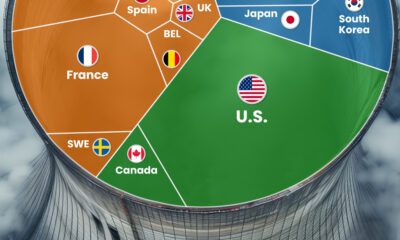
 Energy1 week ago
Energy1 week agoThe World’s Biggest Nuclear Energy Producers
China has grown its nuclear capacity over the last decade, now ranking second on the list of top nuclear energy producers.
-
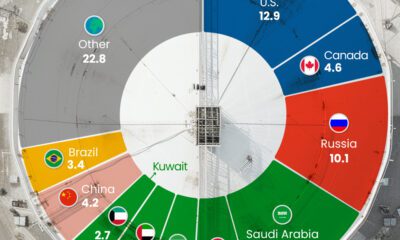
 Energy1 month ago
Energy1 month agoThe World’s Biggest Oil Producers in 2023
Just three countries accounted for 40% of global oil production last year.
-
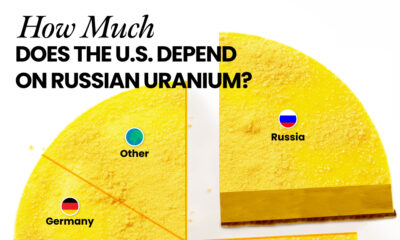
 Energy1 month ago
Energy1 month agoHow Much Does the U.S. Depend on Russian Uranium?
Currently, Russia is the largest foreign supplier of nuclear power fuel to the U.S.
-
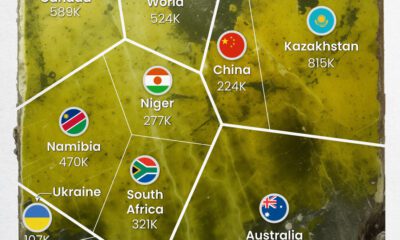
 Uranium2 months ago
Uranium2 months agoCharted: Global Uranium Reserves, by Country
We visualize the distribution of the world’s uranium reserves by country, with 3 countries accounting for more than half of total reserves.
-
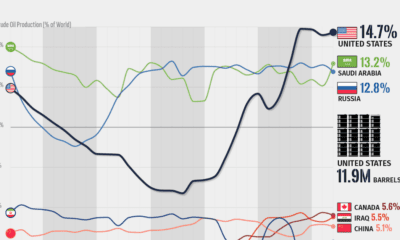
 Energy3 months ago
Energy3 months agoVisualizing the Rise of the U.S. as Top Crude Oil Producer
Over the last decade, the United States has established itself as the world’s top producer of crude oil, surpassing Saudi Arabia and Russia.
-
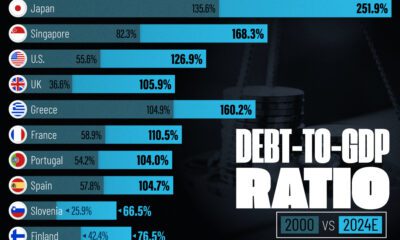
 Debt1 week ago
Debt1 week agoHow Debt-to-GDP Ratios Have Changed Since 2000
-

 Markets2 weeks ago
Markets2 weeks agoRanked: The World’s Top Flight Routes, by Revenue
-

 Countries2 weeks ago
Countries2 weeks agoPopulation Projections: The World’s 6 Largest Countries in 2075
-

 Markets2 weeks ago
Markets2 weeks agoThe Top 10 States by Real GDP Growth in 2023
-

 Demographics2 weeks ago
Demographics2 weeks agoThe Smallest Gender Wage Gaps in OECD Countries
-

 United States2 weeks ago
United States2 weeks agoWhere U.S. Inflation Hit the Hardest in March 2024
-

 Green2 weeks ago
Green2 weeks agoTop Countries By Forest Growth Since 2001
-

 United States2 weeks ago
United States2 weeks agoRanked: The Largest U.S. Corporations by Number of Employees

